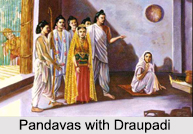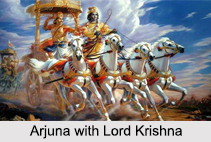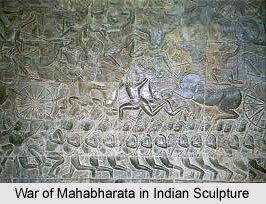 The Pandavas were the five powerful and skilled sons of Pandu, the King of Hastinapur and his two wives were Kunti and Madri. The Pandavas were Yudhistira, Bhima, Arjuna, Nakula, and Sahadeva, they are the central characters in the most applauded epic in Hinduism, the Mahabharata. The brothers were famously involved in the Kurukshetra War with their cousins the Kauravas over who would control the throne of Hastinapur, and were, ultimately, victorious.
The Pandavas were the five powerful and skilled sons of Pandu, the King of Hastinapur and his two wives were Kunti and Madri. The Pandavas were Yudhistira, Bhima, Arjuna, Nakula, and Sahadeva, they are the central characters in the most applauded epic in Hinduism, the Mahabharata. The brothers were famously involved in the Kurukshetra War with their cousins the Kauravas over who would control the throne of Hastinapur, and were, ultimately, victorious.
Birth of Pandavas
King Pandu was cursed by Sage Kidamba that if he ever tried to get intimate with any woman, he would immediately die. Hence, the actual fatherhood of Pandu"s children- the Pandavas, is traditionally attributed to various Gods, in virtue of a boon that Kunti had received from the sage Durvasa and had transferred to Madri, both of whom were the wives of King Pandu. Thus, it said that Yudhisththira was the oldest and the son of Lord Yama, who was the God of death. After that was Bhima, the son of Lord Vayu or the God of Wind, with Arjuna being the third Pandava and the son of Lord Indra, who was the God of Rain. The first three Pandavas were Kunti"s. Madri summoned the Ashwini Kumaras and bore two sons, Nakula was the son of Nasatya, who was the God of Health and Sahadeva was the son of Darsa, who was the God of Medicines. Other than these, Kunti also had a son with Lord Surya, named Karna who was born before she was even married to King Pandu.
 The Pandavas
The Pandavas
Panduputra or the sons of Pandu, as the name suggests there were five Pandavas.
Yudhishthira: The eldest of the Pandavas, Yudhishthira"s name indicates steadfastness at all times, even at war when things are most difficult. As he was the son of Yama, he was the most righteous and steadfast, a follower of Dharma in all walks of life, and shining like the brilliant sun in the knowledge of law, ethics, and morality. He was the most righteous of the Pandavas never having spoken a lie in his life, except during the final war where he was made to suppress the loud truth through neutrality. He was such a steadfast man of righteous deeds that his chariot while moving would remain a few inches above the ground. Unfortunately, due to this fondness for righteousness, he was duped during a game of dice with the Kauravas to gamble his wife Draupadi and lost her.
Bhima: He was the son of the Wind God Vayu, indicating the fierce force and braveness that he inherited. He was the mightiest of the brothers, both in physical prowess and in skill and speed. He was fond of eating and often took the lion"s share of the shared meals of the Pandavas. He was fond of cooking and employed himself as a chief cook in the last year of the Pandavas exile where they were to hide their identity and live unknown to the world. Bhima was the one who took an oath to kill the 100 Kauravas as a result of losing the game of dice and watching helplessly their only wife, Draupadi, getting disrobed by Dushashana, younger brother of Duryodhana.
Arjuna: He was the mightiest in skills, matchless in knowledge, skills, and saintly temper, possessed of divine weapons, and the major responsibility of winning the Kurukshetra war was given to him, as he had Lord Krishna as his charioteer and adviser. His divine weapons, when used, vanquished even the most renowned and skilled warrior. He was the best pal of Lord Krishna, and the recipient of the divine knowledge from Krishna, often called the Bhagavad Gita. During their exile, he endured the most severe austerities and sacrifices and pleased Lord Shiva to appear, who willingly presented him with a divine weapon called the Pashupatastra for his war. Arjuna also had command over devastating weapons like the Brahmastra.
 Nakula: The fourth Pandava brother, Nakula, being the son of the Ashvins, was the most skilled with animals, especially horses and elephants. He was compared to the Lord of Love also known as Kamadeva since he looked beautiful. He was steadfast in his conduct, had superior knowledge of health and cures for many of life`s threatening diseases. He, along with his brother Sahadeva, saved Karna"s life during the war on Kunti"s request, when Karna donated his chest weapon to Indra, Arjuna"s father in an act of charity. Nakula was an excellent sword fighter, equipped with the best of knowledge pertaining to sciences, warfare, and unusual weapons.
Nakula: The fourth Pandava brother, Nakula, being the son of the Ashvins, was the most skilled with animals, especially horses and elephants. He was compared to the Lord of Love also known as Kamadeva since he looked beautiful. He was steadfast in his conduct, had superior knowledge of health and cures for many of life`s threatening diseases. He, along with his brother Sahadeva, saved Karna"s life during the war on Kunti"s request, when Karna donated his chest weapon to Indra, Arjuna"s father in an act of charity. Nakula was an excellent sword fighter, equipped with the best of knowledge pertaining to sciences, warfare, and unusual weapons.
Sahadeva: The fifth and the youngest brother of the Pandavas, Sahadeva was the wisest of all the Pandava brothers and the most mysterious and introverted. Like Nakula, Sahadeva was a master of sword fighting. He was also skilled in fighting and taming wild bulls. Additionally, he was a skilled cowherd, capable of maintaining cattle, treating their diseases, assessing their health, milking them and in producing milk products. Sahadeva acquired mastery over the science of Dharma, religious scriptures and other branches of knowledge under the tutelage of the Sage Brihaspati, the preceptor of the Gods. Sahadeva had the power of the foresight that gave him strong premonition which often warned him of upcoming dangers. During the Kurukshetra War, Sahadeva slew the wicked Shakuni.
Death of Pandavas
The Pandavas ruled Hastinapur for 36 years and established a righteous kingdom. Shortly after the death of Lord Krishna, they all decided that the time had come for them to renounce the world, as the age of Kali Yuga had started. Together along with Draupadi they left to the path of liberation. For this purpose they all climbed Mount Kailash, which leads to the the Swarga Loka. On their way, all except Yudhisthira slipped and died one by one. Yudhishthira was accompanied by a dog who was none other than Lord Yama himself.
The first one to die was Draupadi as she suffered from the vice of partiality, in her affections for Arjuna. Next was Sahadeva, who suffered from the vice of pride and vanity, though none was equal to him in wisdom. After that, it was the fourth Pandava, Nakula also suffered from the vice of pride and vanity, thinking he was the most handsome person in the world. Arjuna is the next person to die without completing the journey, since he too suffered from the same vice as his other two brothers as he thought he was the most skilled, most powerful warrior in the world. Next was the fall of Bhima, since he suffered from the vice of gluttony. Finally, it was just Yudhishthira and Lord Yama in the guise of the dog and entered through the gates of heaven. He expected to find his virtuous brothers or his wife Draupadi but instead he saw Karna, Bhishma, Dronacharya etc. and their sons.
Yudhishthira was told that his siblings and wife were taken to hell and were experiencing the reactions of their actions but it was temporary. Once the debt had been repaid, they would join Yudhishthira in heaven. Yudhishthira instead went to hell himself and decided to stay there with his family than being in heaven surrounded by his enemies. Eventually this turned out to be another illusion to test him.












